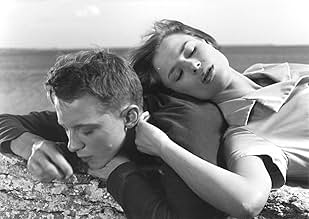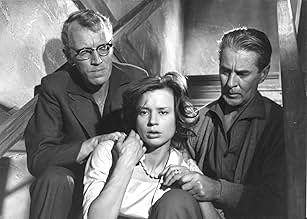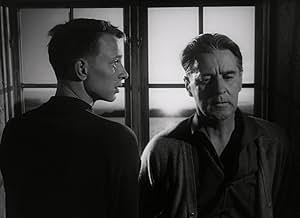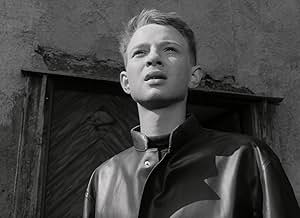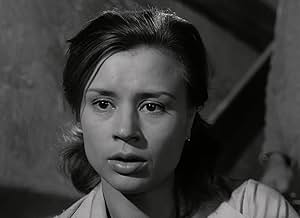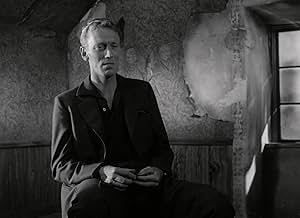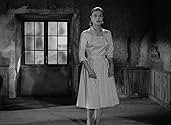NOTE IMDb
7,9/10
29 k
MA NOTE
Sortie récemment d'un hôpital psychiatrique, Karin retrouve sa famille affectivement déconnectée et leur maison sur une île, uniquement pour perdre pied avec la réalité en commençant à croir... Tout lireSortie récemment d'un hôpital psychiatrique, Karin retrouve sa famille affectivement déconnectée et leur maison sur une île, uniquement pour perdre pied avec la réalité en commençant à croire que Dieu se manifeste à elle.Sortie récemment d'un hôpital psychiatrique, Karin retrouve sa famille affectivement déconnectée et leur maison sur une île, uniquement pour perdre pied avec la réalité en commençant à croire que Dieu se manifeste à elle.
- Réalisation
- Scénario
- Casting principal
- Récompensé par 1 Oscar
- 3 victoires et 5 nominations au total
Avis à la une
This film's title is taken from the Bible: "For now we see through a glass, darkly; but then face to face: now I know in part; but then shall I know even as also I am known." (1 Cor 13:12).
The film is a major work of cinema and a major work of Bergman. If one looks at the body of Bergman's films he was probably approaching his peak of artistry, which he would achieve in his next work "Winter light", a film that Bergman himself called perfect. The reason most viewers do not grasp the importance of the magnificent "Man-God trilogy" or "the Silence trilogy" or "the Dark/Faith trilogy" (three films: "Through a glass darkly", "Winter light", and "the Silence") is that the trilogy deals with the theological question of God's existence. It is essentially a thinking person's film. If you can reflect on what you see, these three films are a treasurea treasure that influenced major directors several decades later, specifically Kieslowski who made "Three Colors: Blue" also almost entirely based on 1 Corinthians Chapter 13, Tarkovsky who seems to have borrowed some ideas like the sudden baptismal rain from this film that he employs in "Solyaris" and "Stalker" and finally the exciting new talent from Russia Andrei Zvyagintsev (director of "The Return", also taking a leaf from the Bergmanesque sonfather relationship). All these films seem to have been influenced by this seminal work of Bergman.
To those viewers, who are not spiritually inclined, the film could be reduced to the obvious action of Harriet Anderson's character Karin insisting on wearing goggles as she steps out of her home to live the rest of her life in a hospital. It could easily be interpreted as a study of mental illness, a film that gives credence to the theory that god does not exist. The film can equally be interpreted as a film on mad people who feel they are in communion with god, who at other times are slaves to dark forces (voices).
On the other hand one can argue the intensity of the light is a metaphor for a sign that God existsthe basic question that troubled Bergman, the son of a priest, in real life. Even the young Minus kneels down to pray to God as the rain (baptismal?) falls suddenly. A keen viewer will note that there is no sign of rain on island or of rain drenching men in an open boat soon after the event. Only Karin's hair is wet. All three films seek an answer that God exists from a silent, "inscrutable" (to quote a word from this film) God to whom millions pray. "Through a glass darkly" opens with a shot of the almost still, dark waters of the sea mirroring the sky. The film ends with several references of light. For the cynical, Bergman was disillusioned and felt that God was a "spider" (the intriguing image for the DVD covers of the three films), a reference to Karin's outburst towards the end of the film. If Bergman, was truly disillusioned, would he have added the final epilogue where the father tells his son "God exists in love, in every sort of love, maybe God is love." These last words make the son say my father has "talked to me" the penultimate words of the filma seemingly spiritual response even Jesus on the cross wanted ("Father, father, why hast thou forgotten me?") before he died.
It would be ridiculous to see this work merely as a film seeking answers to God's existence. Like "Three colors: Blue", this is a film on love. There is the undiluted love of an atheist husband (shades of Bergman?) for his ailing wife (note the film is dedicated to Kabi, Bergman's wife at a point when divorce was looming large). There is love of a father for his daughter, son and son-in-law triggered by a failed suicide attempt (only recalled in the film). There is love between siblings.
The film is also about marriage. Visually, the film emphasizes the wedding ring in the scenes involving husband (the camera captures the wedding ring on the finger several times) and wife (she puts it on after she washes her face). The son asks with an innocent cockiness of the father who has recently divorced his second wife Marianne (never shown on screen) if "he has lost all stability, spiritually"? Structurally Bergman doffs his cap to Shakespeare by adding a one act play within the film on the lines of "Hamlet" to drive home a point to the father and his illusion of love for his perfect work of art at the expense of depriving love for his near and dear.
In more ways than one, this is a thinking person's film. After viewing the film several times, one is in awe of this filmmaker so prolific, so perfect and so sensitive. What he has written for cinema can be compared to the output of great writers like Tolstoy and Shakespeare. He was truly a genius. I do agree with Bergman when he avers that the three films in the trilogy are not connected and are stand alone films. The only common link among the three films is Bergman's personal quest for a response from a silent God that his father believed in and in whom Bergman was brought up to believe in. These are not films of an atheist but works from a genius "flirting with God" to quote from the film itself.
Many years after he made the film, Bergman was uncomfortable with the final scene. The doubting Thomas in Bergman had resurfaced. Yet he never reworked on the film. The film has much to offer for a student of cinema: it is made of fine photography, art direction, acting, scriptwriting, editing and sound (Bach plus the horn of the lighthouse). Undoubtedly one of Bergman's finest works, it anticipates the perfect "Winter light," the next film that Bergman wrote and directed.
The film is a major work of cinema and a major work of Bergman. If one looks at the body of Bergman's films he was probably approaching his peak of artistry, which he would achieve in his next work "Winter light", a film that Bergman himself called perfect. The reason most viewers do not grasp the importance of the magnificent "Man-God trilogy" or "the Silence trilogy" or "the Dark/Faith trilogy" (three films: "Through a glass darkly", "Winter light", and "the Silence") is that the trilogy deals with the theological question of God's existence. It is essentially a thinking person's film. If you can reflect on what you see, these three films are a treasurea treasure that influenced major directors several decades later, specifically Kieslowski who made "Three Colors: Blue" also almost entirely based on 1 Corinthians Chapter 13, Tarkovsky who seems to have borrowed some ideas like the sudden baptismal rain from this film that he employs in "Solyaris" and "Stalker" and finally the exciting new talent from Russia Andrei Zvyagintsev (director of "The Return", also taking a leaf from the Bergmanesque sonfather relationship). All these films seem to have been influenced by this seminal work of Bergman.
To those viewers, who are not spiritually inclined, the film could be reduced to the obvious action of Harriet Anderson's character Karin insisting on wearing goggles as she steps out of her home to live the rest of her life in a hospital. It could easily be interpreted as a study of mental illness, a film that gives credence to the theory that god does not exist. The film can equally be interpreted as a film on mad people who feel they are in communion with god, who at other times are slaves to dark forces (voices).
On the other hand one can argue the intensity of the light is a metaphor for a sign that God existsthe basic question that troubled Bergman, the son of a priest, in real life. Even the young Minus kneels down to pray to God as the rain (baptismal?) falls suddenly. A keen viewer will note that there is no sign of rain on island or of rain drenching men in an open boat soon after the event. Only Karin's hair is wet. All three films seek an answer that God exists from a silent, "inscrutable" (to quote a word from this film) God to whom millions pray. "Through a glass darkly" opens with a shot of the almost still, dark waters of the sea mirroring the sky. The film ends with several references of light. For the cynical, Bergman was disillusioned and felt that God was a "spider" (the intriguing image for the DVD covers of the three films), a reference to Karin's outburst towards the end of the film. If Bergman, was truly disillusioned, would he have added the final epilogue where the father tells his son "God exists in love, in every sort of love, maybe God is love." These last words make the son say my father has "talked to me" the penultimate words of the filma seemingly spiritual response even Jesus on the cross wanted ("Father, father, why hast thou forgotten me?") before he died.
It would be ridiculous to see this work merely as a film seeking answers to God's existence. Like "Three colors: Blue", this is a film on love. There is the undiluted love of an atheist husband (shades of Bergman?) for his ailing wife (note the film is dedicated to Kabi, Bergman's wife at a point when divorce was looming large). There is love of a father for his daughter, son and son-in-law triggered by a failed suicide attempt (only recalled in the film). There is love between siblings.
The film is also about marriage. Visually, the film emphasizes the wedding ring in the scenes involving husband (the camera captures the wedding ring on the finger several times) and wife (she puts it on after she washes her face). The son asks with an innocent cockiness of the father who has recently divorced his second wife Marianne (never shown on screen) if "he has lost all stability, spiritually"? Structurally Bergman doffs his cap to Shakespeare by adding a one act play within the film on the lines of "Hamlet" to drive home a point to the father and his illusion of love for his perfect work of art at the expense of depriving love for his near and dear.
In more ways than one, this is a thinking person's film. After viewing the film several times, one is in awe of this filmmaker so prolific, so perfect and so sensitive. What he has written for cinema can be compared to the output of great writers like Tolstoy and Shakespeare. He was truly a genius. I do agree with Bergman when he avers that the three films in the trilogy are not connected and are stand alone films. The only common link among the three films is Bergman's personal quest for a response from a silent God that his father believed in and in whom Bergman was brought up to believe in. These are not films of an atheist but works from a genius "flirting with God" to quote from the film itself.
Many years after he made the film, Bergman was uncomfortable with the final scene. The doubting Thomas in Bergman had resurfaced. Yet he never reworked on the film. The film has much to offer for a student of cinema: it is made of fine photography, art direction, acting, scriptwriting, editing and sound (Bach plus the horn of the lighthouse). Undoubtedly one of Bergman's finest works, it anticipates the perfect "Winter light," the next film that Bergman wrote and directed.
Her eyes could not deceive what her mind made her believe, though to others she's disturbed and increasingly perturbed, as a cocktail of delusion, creates confusion and illusion, and there's nothing they can do, except observe as she looks through.
There are outstanding performances and there are Harriet Andersson performances and there is a difference between the two, especially under the guidance of this director, as she takes you on the nightmare that Karin lives, the struggles she endures (and of those that surround her), as her world cascades through torment and torture that she can do very little about, and at the time nobody else could be of much help either.
There are outstanding performances and there are Harriet Andersson performances and there is a difference between the two, especially under the guidance of this director, as she takes you on the nightmare that Karin lives, the struggles she endures (and of those that surround her), as her world cascades through torment and torture that she can do very little about, and at the time nobody else could be of much help either.
10jhclues
A character study set on a secluded island off the coast of Sweden, `Through A Glass, Darkly' is Ingmar Bergman's pensive chronicle of a young woman's descent into the maelstrom of schizophrenia. The story centers on Karin (Harriet Andersson), who has reached a pivotal juncture in her life; having just been released from a mental hospital, she must now face the uncertainties inherent in the nature of her illness. It is a crucial period in her life; she occupies a middle ground between two worlds, and the question now is, will she ultimately emerge in the light, or succumb to the darkness of the voices that beckon her from within. Through Bergman's eyes we observe the effects of her situation on the three people closest to her, her husband, Martin (Max von Sydow), her father, David (Gunnar Bjornstrand) and her brother, Minus (Lars Passgard). The movie explores their relationships to Karin (and to one another), and how differently each one them strives to cope with and understand her elusive affliction. An absorbing, evocative and sometimes tense drama, the film is impeccably delivered by Bergman, and the performances are all exemplary, especially Harriet Andersson, who brings the tortured soul of Karin to life with nuance and a depth and grasp of the character that is remarkable. Von Sydow is also perfect as the troubled Martin, and aptly conveys the quandary of his situation, which he approaches with a reserved, committed gentleness. Bjornstrand maintains a stoic presence throughout as the novelist/father attempting to resolve an inner conflict borne of guilt and doubtful motives, and Passgard gives a notable performance, as well; his angst and confusion are deeply felt and well played. The first of Bergman's 'Faith' trilogy (followed by `Winter Light' and `The Silence'), `Through A Glass, Darkly' is one of his finest works, an intricate exploration of the fragility of the human psyche and the complexities of life. An Oscar winner for Best Foreign Film of 1961, it firmly establishes Bergman as one of Cinema's greatest directors. It is an emotional and engrossing film that should not be missed. I rate this one 10/10.
Bergman's haunting, somber feature "Through a Glass Darkly" is the kind of distinctive, sometimes uncomfortable, and carefully-crafted movie that can stick in the minds of its viewers long afterwards. Its combination of images, scenery, characters, and themes provides plenty of things to think about, more than could be assimilated in any one viewing. Bergman is one of the very few film-makers who had the knack for making this kind of feature coherent and memorable at the same time.
The story could hardly be more efficient. The very small cast and the tight scenario place a premium on the writing, acting, and photography. The characters have a good balance of similarities and differences that makes for a wide range of possibilities, and the story makes good use of them. The seaside setting is used nicely, with the beautiful scenery and thematic images both complementing the story. The old shipwreck is skillfully worked into a psychologically harrowing sequence.
The setting is combined with the family relationships, biblical allusions, philosophical questions, and much more, to raise a wide range of interesting and thoughtful questions. Although "Through a Glass Darkly" does not feature the extensive use of unusual imagery found in Bergman features like "The Seventh Seal" or "Persona", or the dream sequence from "Wild Strawberries", in its own way it is also effective.
The story could hardly be more efficient. The very small cast and the tight scenario place a premium on the writing, acting, and photography. The characters have a good balance of similarities and differences that makes for a wide range of possibilities, and the story makes good use of them. The seaside setting is used nicely, with the beautiful scenery and thematic images both complementing the story. The old shipwreck is skillfully worked into a psychologically harrowing sequence.
The setting is combined with the family relationships, biblical allusions, philosophical questions, and much more, to raise a wide range of interesting and thoughtful questions. Although "Through a Glass Darkly" does not feature the extensive use of unusual imagery found in Bergman features like "The Seventh Seal" or "Persona", or the dream sequence from "Wild Strawberries", in its own way it is also effective.
Well, we don't see darkly through a glass, and Bergman explains in his "Introductions" that during the ancient times, there were no glass, the mirrors were made of metal, bronze, for instance and while looking through the metal mirror, the face and the background appear darker than in reality. Does it mean that when we look inside ourselves like in the mirror, we appear darker and more sinister than we are? Or the other way around?
"Through a Glass Darkly" is a typically great Bergman's film - four people arrive to an isolated island to spend a few days together, a young woman, her husband, father, and brother. They seem to love one another and are perfectly happy and comfortable in the beginning. It does not last long - not in the Bergman's world. Harriet Anderson was amazing as Karin, a mentally sick young woman, who was just released from the hospital but I believe three other actors playing Father (Gunnar Bjornstrand), Husband (Max von Sydow), and Brother (Lars Passgård) were as good as she was. The Father was especially interesting - he was a reason Karin became ill on the first place and his diary sent her to the total mental breakdown. As with "Persona" and "Autumn Sonata", Bergman is asking again how far is an Artist willing to go for his Art? Here, Father, the writer wants to be a cool and remote observer of his daughter's mental tragedy as a study for his future work. There is a hope, though, in the end. Not for Karin - it is too late for her - but for her confused young brother who is also fighting for his sanity and desperately needs his father's love and understanding. His last words - "Daddy talked to me" - give this bleak and tragic story the hope that his life could be different. Or maybe not...
"Through a Glass Darkly" is a typically great Bergman's film - four people arrive to an isolated island to spend a few days together, a young woman, her husband, father, and brother. They seem to love one another and are perfectly happy and comfortable in the beginning. It does not last long - not in the Bergman's world. Harriet Anderson was amazing as Karin, a mentally sick young woman, who was just released from the hospital but I believe three other actors playing Father (Gunnar Bjornstrand), Husband (Max von Sydow), and Brother (Lars Passgård) were as good as she was. The Father was especially interesting - he was a reason Karin became ill on the first place and his diary sent her to the total mental breakdown. As with "Persona" and "Autumn Sonata", Bergman is asking again how far is an Artist willing to go for his Art? Here, Father, the writer wants to be a cool and remote observer of his daughter's mental tragedy as a study for his future work. There is a hope, though, in the end. Not for Karin - it is too late for her - but for her confused young brother who is also fighting for his sanity and desperately needs his father's love and understanding. His last words - "Daddy talked to me" - give this bleak and tragic story the hope that his life could be different. Or maybe not...
Le saviez-vous
- AnecdotesThe first Ingmar Bergman film to be made on the island of Fårö. Bergman would later buy a home on the island.
- GaffesAs Minus paints the chair, the amount of paint on the chair changes between shots.
- Crédits fousThere are no end credits. After Minus (Lars Passgård) says the final line, the film fades to black and ends. The entire cast and crew were credited at the start, and there isn't even a "Fin" or "Ende".
- ConnexionsFeatured in Reel Radicals: The Sixties Revolution in Film (2002)
- Bandes originalesSarabande from Suite No. 2 in D minor for Violoncello
Written by Johann Sebastian Bach
Performed by Blondal Bengston.
Meilleurs choix
Connectez-vous pour évaluer et suivre la liste de favoris afin de recevoir des recommandations personnalisées
- How long is Through a Glass Darkly?Alimenté par Alexa
Détails
Box-office
- Montant brut mondial
- 8 939 $US
- Durée1 heure 30 minutes
- Couleur
- Mixage
- Rapport de forme
- 1.37 : 1
Contribuer à cette page
Suggérer une modification ou ajouter du contenu manquant

Lacune principale
By what name was À travers le miroir (1961) officially released in India in English?
Répondre

